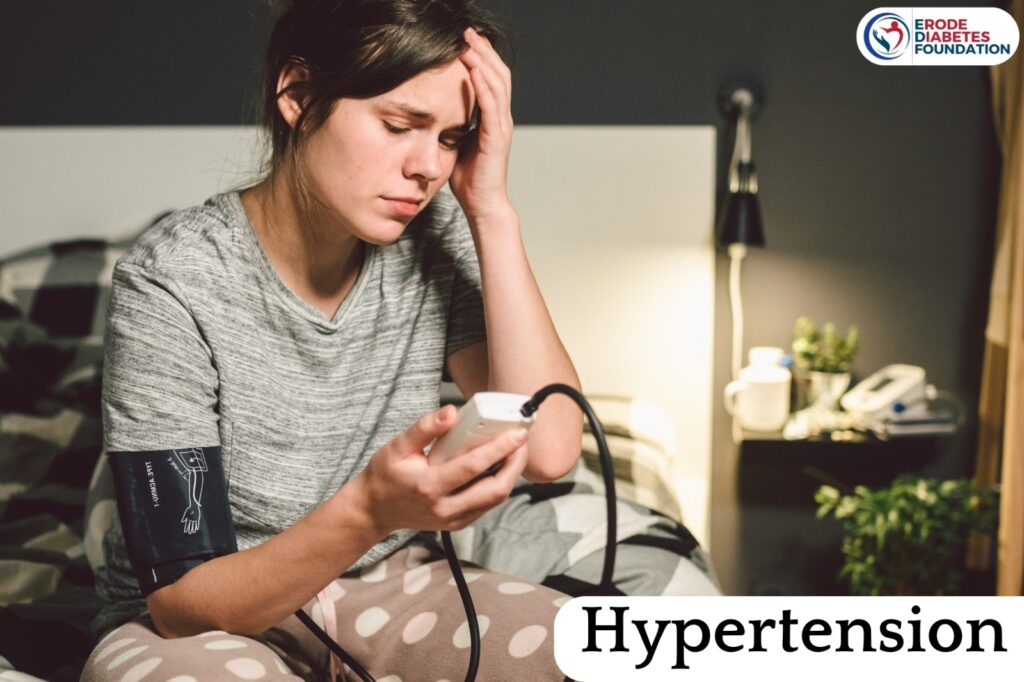Hypertension, is a major health concern that can lead to serious complications, especially for individuals with diabetes. Managing blood pressure is crucial for diabetics to avoid additional health issues such as cardiovascular disease, stroke, and kidney damage. In this blog, let’s learn what Hypertension or High blood pressure is, its symptoms, risks, and preventive measures.

What is Hypertension?
Hypertension or high blood pressure, happens when the pressure of your blood against your artery walls is regularly too high. To check blood pressure, measure two numbers in millimeters of mercury (mm Hg): systolic and diastolic pressures. Generally, a normal reading is about 120/80 mm Hg. However, you have hypertension if your readings are usually over 130/80 mm Hg.
Concern for Diabetics
Diabetes and hypertension often occur together, significantly increasing the risk of cardiovascular diseases. High blood sugar levels can damage blood vessels and the nerves that control the heart and blood vessels, making the heart work harder. This can lead to increased blood pressure. Additionally, insulin resistance associated with type 2 diabetes can cause the kidneys to retain salt and water, contributing to higher blood pressure.
Hypertension Symptoms
Hypertension is often referred to as a “silent killer” because it typically has no noticeable symptoms until significant damage has been done. However, it sometimes can have the following symptoms in certain individuals:
- Headaches often occur in the morning.
- Shortness of breath is experienced during normal activities.
- Nosebleeds become more frequent than usual.
- Chest pain is felt as pressure or tightness in the chest.
- Dizziness makes one feel lightheaded or faint.
- Visual changes are noticed, such as blurred or double vision.
Risks Associated with Hypertension
Untreated hypertension can lead to several serious health issues, including:
- Heart Disease results in an increased risk of heart attacks and heart failure.
- Stroke may occur due to high blood pressure, leading to blood vessel rupture or blockage in the brain.
- Hypertension can damage arteries surrounding the kidneys, impairing their blood filtration function.
- Vision Loss is a consequence of high blood pressure damaging blood vessels in the eyes.
- Metabolic Syndrome encompasses conditions like high blood sugar, increased waist circumference, and abnormal cholesterol levels.
Preventive Measures to reduce the Risk of Hypertension
- Regularly check your blood pressure and monitor your blood sugar levels.
- Stay hydrated to maintain optimal blood volume and pressure.
- Get 7-9 hours of sleep every day.
- Moderate caffeine consumption to prevent temporary blood pressure increases.
- Eat potassium-rich foods like bananas, potatoes, and spinach to balance sodium and ease tension in blood vessels.
- Aim for less than 2,300 mg of sodium (5.75 gms of salt)per day, preferably around 1,500(3.75 gms )mg.
- Eat plenty of greens, vegetables, fruits, lean proteins, and whole grains.
- Limit refined sugars and carbs to control blood sugar and blood pressure.
- Do moderate exercise at least 150 minutes per week.
- Maintain a healthy weight.
- Follow prescribed medications for diabetes and hypertension.
- Reduce alcohol intake and avoid tobacco consumption.
- Manage stress with techniques like yoga, meditation, and deep breathing exercises.
To Sum-up
Hypertension or High blood pressure is a serious health risk, especially for individuals with diabetes. By taking the mentioned steps, can significantly help in managing hypertension for diabetics and its associated complications. Additionally, regular check-ups with a Physician / diabetologist are crucial for personalized care, as they can provide monitoring and dietary suggestions to optimize health outcomes. Remember, effective management of both diabetes and hypertension can lead to a healthier, more active life.


